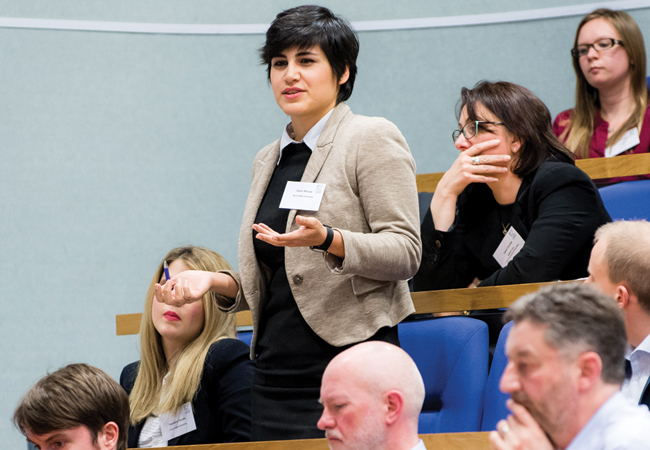
Audience member at the 2016 Technical Symposium
There is only one week to go until the 2017 CIBSE ASHRAE Technical Symposium, which this year takes place at Loughborough University on 5-6 April.
Over the next few days, the CIBSE Journal will highlight some papers that will be presented at the event, giving you a flavour of what to expect at the 7th Technical Symposium.
This year’s theme is ‘Delivering resilient high performance buildings’, which is inspired by this year’s ASHRAE and CIBSE presidential themes, respectively ‘Adapt Today to Shape Tomorrow’ and ‘Improving
Performance’.
The aim of the 2017 Technical Symposium is to provide evidence of the successful adoption of resilience in the design and operation of buildings.
A preliminary agenda is available at the CIBSE website.
Today’s mini-preview looks at papers by Melody Wang of Affiliated Engineers, California, USA, and Sophia Flucker, of Operational Intelligence, UK.
Melody Wang will examine the challenges of adapting systems design to meet the changing role of buildings. By considering how occupants’ requirements for 21st century thermal comfort and transformed expectations for building use, Wang will examine how the renovation of a university campus – originally built in the 1950s – can succeed despite budget, space and building/system information constraints, and while preserving the building’s heritage.
This case study will look at multiple campus renovation projects at the University of Florida that produced more resilient buildings for the future.
Sophia Flucker will examine how the environmental impact of data centres can be minimised beyond energy efficiency. By developing a lifecycle approach, Flucker will explain that there are two other significant areas of impact – the embodied impact of materials and the grid power source.
By focusing purely on energy efficiency, operators may cause a burden shift by taking action to reduce energy consumption while increasing the embodied impact and, although there is limited data, available research has identified which factors significantly impact a facility’s environmental impact. She will promote that this should be used not only in the design process but throughout the data centre lifecycle.

